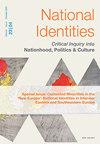建立还是毁灭这个国家?这反映了莫伊总统的政权
IF 0.7
Q3 POLITICAL SCIENCE
引用次数: 0
摘要
摘要本研究探讨了肯尼亚第二任总统丹尼尔·阿拉普·莫伊试图建立一种共同的民族认同感。通过对有关他的书籍、演讲和报纸文章的内容分析,可以发现莫伊如何利用尼亚约哲学、国家假日、国家之父叙事、纸币和硬币以及纪念碑来培养肯尼亚的民族认同。尽管努力建立一个共同的国家认同,但政府的运作方式经常与莫伊在演讲中所说的不一致。尽管莫伊总统倡导和平、爱和团结,但他的政府在很大程度上以庇护主义、庇护主义、社会和地区不平等、种族间暴力以及其他社会、经济和政治罪恶为特征。由于莫伊所宣称的和他的政府实际所做的之间的脱节,他培育国家的尝试可以被看作是他控制国家、巩固权力和使他的领导合法化的一种方式。因此,在莫伊统治期间,国家认同建设缺乏一种强烈的集体意识,而这种集体意识本可以使肯尼亚人将对国家的归属感和依恋感制度化。关键词:国家公民身份民族身份披露声明作者未发现潜在的利益冲突。数据可用性声明本工作中使用的所有数据均已相应引用。其他信息关于贡献者的说明fred NasuboDr。弗雷德·纳苏博研究、写作和教学,对身份政治、公民身份、国家品牌和治理特别感兴趣。他是塔塔塔维塔大学的讲师,也是英国东非研究所的研究员。纳苏博拥有喀麦隆雅温德省泛非大学治理、人文与社会科学研究所治理与区域一体化博士学位,以及肯尼亚埃格顿大学历史学硕士和历史学与经济学学士学位。本文章由计算机程序翻译,如有差异,请以英文原文为准。
Making or unmaking the nation? A reflection of president Moi’s regime
ABSTRACTThis study explores Kenya’s second President, Daniel Arap Moi’s attempts to establish a sense of a shared national identity. Content analysis of books written about him, his speeches, and newspaper articles reveals how Moi used Nyayo philosophy, national holidays, the Father of the Nation narrative, currency notes and coins, and monuments to foster a Kenyan national identity. Despite efforts to forge a common national identity, the government frequently operated in a way that was at odds with what Moi said in his speeches. Whereas President Moi advocated for peace, love, and unity, his administration was largely characterised by clientelism, patronism, social and regional inequalities, and interethnic violence, among other social, economic and political evils. Because of the disconnect between what Moi claimed and what his administration actually did, his attempts to foster nationhood could alternatively be seen as a way for him to control the state, consolidate power, and legitimize his leadership. Therefore, during Moi’s rule, national identity building lacked a strong collective consciousness, which would have enabled Kenyans to institutionalise a sense of belonging and attachment to the nation.KEYWORDS: Countrycivic identityethnic identitynational identitynation Disclosure statementNo potential conflict of interest was reported by the author(s).Data availability statementAll data used in this work has been referenced accordingly.Additional informationNotes on contributorsFred NasuboDr. Fred Nasubo researches, writes and teaches with a particular interest in identity politics, citizenship, nation branding and governance. He is a lecturer at Taita Taveta University and Research Fellow at the British Institute in Eastern Africa. Nasubo holds a PhD in Governance and Regional Integration from Pan African University, Institute of Governance, Humanities and Social Sciences-Yaoundé Cameroon, and a Masters of Arts in History, and BA in History & Economics from Egerton University-Kenya.
求助全文
通过发布文献求助,成功后即可免费获取论文全文。
去求助
来源期刊

NATIONAL IDENTITIES
POLITICAL SCIENCE-
CiteScore
1.70
自引率
0.00%
发文量
37
期刊介绍:
National Identities explores the formation and expression of national identity from antiquity to the present day. It examines the role in forging identity of cultural (language, architecture, music, gender, religion, the media, sport, encounters with "the other" etc.) and political (state forms, wars, boundaries) factors, by examining how these have been shaped and changed over time. The historical significance of "nation"in political and cultural terms is considered in relationship to other important and in some cases countervailing forms of identity such as religion, region, tribe or class. The focus is on identity, rather than on contingent political forms that may express it. The journal is not prescriptive or proscriptive in its approach.
 求助内容:
求助内容: 应助结果提醒方式:
应助结果提醒方式:


